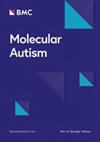
Molecular Autism
分子自閉癥
- 研究方向:醫(yī)學(xué)
- 影響因子:5.712
- 官網(wǎng):http://molecularautism.biomedcentral.com/
- 投稿地址:https://www.editorialmanager.com/mola/default.aspx
中文簡(jiǎn)介
《分子自閉癥》是一本經(jīng)過同行評(píng)審的開放獲取期刊,出版高質(zhì)量的基礎(chǔ)、轉(zhuǎn)化和臨床研究,與自閉癥的病因?qū)W、病理生物學(xué)或治療以及相關(guān)的神經(jīng)發(fā)育條件有關(guān)。鼓勵(lì)包括跨級(jí)別集成的研究。分子自閉癥發(fā)表經(jīng)驗(yàn)研究、評(píng)論和簡(jiǎn)短的交流。我們鼓勵(lì)來自不同領(lǐng)域的投稿,包括(但不限于)遺傳學(xué)、分子神經(jīng)生物學(xué)、神經(jīng)病理學(xué)、神經(jīng)成像、認(rèn)知神經(jīng)科學(xué)、流行病學(xué)和生物標(biāo)志物的發(fā)現(xiàn)。《分子自閉癥》雜志還發(fā)表了關(guān)于篩查、診斷和分類的文章,包括考慮進(jìn)行分組以改進(jìn)我們對(duì)基本機(jī)制的理解的文章。干預(yù)研究也很受歡迎,尤其是在考慮揭示因果機(jī)制時(shí)。雖然主要關(guān)注自閉癥譜系障礙(包括阿斯伯格綜合癥),但范圍包括對(duì)相關(guān)神經(jīng)發(fā)育障礙的分子研究,如特定語言障礙、運(yùn)動(dòng)障礙和特定或一般發(fā)育遲緩;和相關(guān)的醫(yī)學(xué)癥狀,如脆性X綜合征,結(jié)節(jié)性硬化癥,和勒特綜合癥。《分子自閉癥》也考慮沒有分子數(shù)據(jù)的文章,但從長遠(yuǎn)來看,這些文章可能會(huì)縮小自閉癥患者從分子到行為之間的差距。該雜志歡迎來自這一復(fù)雜事件鏈的兩端的報(bào)告和對(duì)優(yōu)秀科學(xué)的評(píng)論:要么從分子上,要么從行為上。報(bào)告和審查可以是基本的和/或翻譯的。請(qǐng)注意,由于我們很少接受未經(jīng)請(qǐng)求的評(píng)審,如果潛在評(píng)審的作者認(rèn)為某個(gè)重要主題沒有得到充分的評(píng)審,并且在理想情況下,他們建議進(jìn)行系統(tǒng)評(píng)審,我們強(qiáng)烈建議他們使用提交前查詢系統(tǒng)。
英文簡(jiǎn)介
Molecular Autism is a peer-reviewed, open access journal that publishes high-quality basic, translational and clinical research that has relevance to the etiology, pathobiology, or treatment of autism and related neurodevelopmental conditions. Research that includes integration across levels is encouraged. Molecular Autism publishes empirical studies, reviews, and brief communications.We encourage submissions from a range of fields including (but not restricted to) genetics, molecular neurobiology, neuropathology, neuroimaging, cognitive neuroscience, epidemiology, and biomarker discovery. Molecular Autism also publishes articles on screening, diagnosis and classification, including articles that consider subgrouping to refine our understanding of basic mechanisms. Intervention studies are also welcome, especially when considered with respect to revealing causal mechanisms.Although the primary focus is on conditions on the autism spectrum (including Asperger syndrome), the scope encompasses molecular research into related neurodevelopmental conditions such as specific language impairment, dyspraxia, and specific or general developmental delays; and into related medical syndromes such as fragile X syndrome, tuberous sclerosis, and Rett syndrome.Molecular Autism also considers articles with no molecular data but which, in the long-term, may close the gap from molecule to behavior in autism. The journal welcomes reports and reviews of good science that proceed from either end of this complex chain of events: from molecule upwards, or from behavior downwards. Reports and reviews can be basic and/or translational. Note that, because we rarely accept unsolicited reviews, we strongly encourage authors of potential reviews to make use of the presubmission inquiry system if they feel that an important topic has not been adequately reviewed and where, ideally, they are proposing a systematic review.
近年期刊自引率趨勢(shì)圖
JCR分區(qū)
| JCR分區(qū)等級(jí) | JCR所屬學(xué)科 | 分區(qū) | 影響因子 |
| Q1 | NEUROSCIENCES | Q1 | 6.476 |
| GENETICS & HEREDITY | Q1 |
近年期刊影響因子趨勢(shì)圖
CiteScore數(shù)值
| CiteScore | SJR | SNIP | 學(xué)科類別 | 分區(qū) | 排名 | 百分位 |
| 10.00 | 1.666 | 1.882 | 大類:Neuroscience 小類:Developmental Neuroscience | Q1 | 2 / 37 |
95% |
| 大類:Neuroscience 小類:Psychiatry and Mental Health | Q1 | 29 / 529 |
94% |
|||
| 大類:Neuroscience 小類:Developmental Biology | Q1 | 9 / 80 |
89% |
|||
| 大類:Neuroscience 小類:Molecular Biology | Q1 | 71 / 386 |
81% |
相關(guān)醫(yī)學(xué)SCI期刊推薦
- BimonthlyJANAC-JOURNAL OF THE ASSOCIATION OF NURSES IN AIDS CARE
- MonthlyJOURNAL OF REHABILITATION MEDICINE
- QuarterlyPHARMACOLOGICAL REVIEWS
- QuarterlyJournal of Community Health Nursing
- MonthlyJOURNAL OF CLINICAL MICROBIOLOGY
- QuarterlyCLINICS IN PLASTIC SURGERY
- QuarterlyCANCER AND METASTASIS REVIEWS
- MonthlyActas Urologicas Espanolas
- Pain Research & Management
- Oncology Research and Treatment
SCI期刊欄目
SCI期刊 工程技術(shù) 物理 生物 化學(xué) 醫(yī)學(xué) 農(nóng)林科學(xué) 數(shù)學(xué) 地學(xué)天文 地學(xué) 環(huán)境科學(xué)與生態(tài)學(xué) 綜合性期刊 管理科學(xué) 社會(huì)科學(xué)
期刊論文百科問答
- 攝影藝術(shù)領(lǐng)域AHCI期刊推薦《Photography And Culture》
- Nature旗下多學(xué)科子刊Nature Communications
- 中小學(xué)教師值得了解,這些教育學(xué)期刊發(fā)論文容易被人大復(fù)印轉(zhuǎn)載
- 2025年寫管理學(xué)論文可以用的19個(gè)選題
- 測(cè)繪領(lǐng)域科技核心期刊選擇 輕松拿捏
- 及時(shí)開論文檢索證明很重要
- 中國水產(chǎn)科學(xué)期刊是核心期刊嗎
- 國際出書需要了解的問題解答
- 合著出書能否評(píng)職稱?
- 電信學(xué)有哪些可投稿的SCI期刊,值得關(guān)注!
